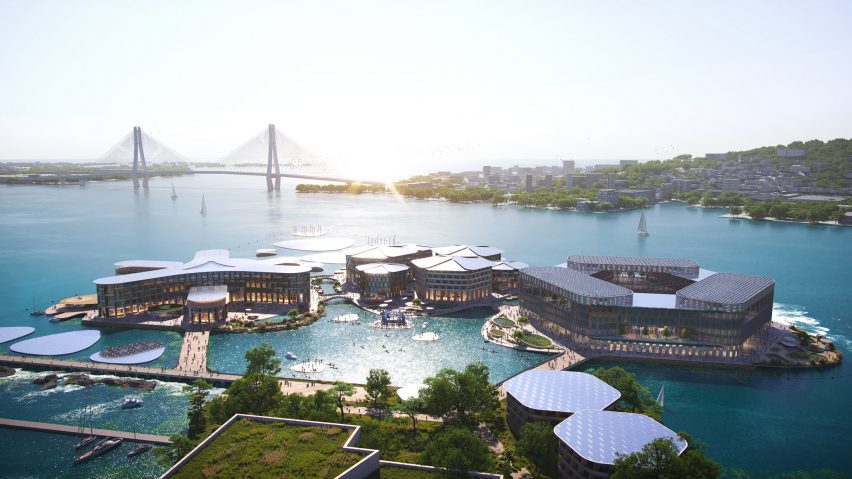Architecture firms BIG and Samoo and tech company Oceanix have revealed their design for a first-of-its-kind climate-resilient floating city, destined for the seas off Busan in South Korea.
Oceanix Busan is being developed by UN-Habitat and the Busan Metropolitan City and designed by floating cities company Oceanix in collaboration with partners including BIG and Samoo.
UN-Habitat calls Oceanix Busan "the world's first prototype floating city" and aims for it to provide a model for coastal cities facing threats from flooding and rising sea levels due to climate change.
It says Oceanix Busan – which expands urban development into the ocean with habitation built on floating platforms – is sustainable, resilient and flood-proof.
The development is composed of a series of interconnected neighbourhoods: initially, it will comprise three platforms hosting 12,000 residents, but with the potential to expand to more than 20 platforms over time.
Oceanix, BIG and their partners designed it to be site-specific to Busan, emulating the characteristics of the city so that it blends in with the existing architecture and culture.
"In designing a solution for the most vulnerable coastal locations on the frontlines of climate change, Oceanix's new modular maritime neighbourhoods will be a prototype for sustainable communities informed by Busan's unique juxtaposition of old and new," said BIG founder and creative director Bjarke Ingels.
"Creating a connection between the city and the seaside, Oceanix Busan will expand this spirit onto the waterfront."
While each 30,000- to 40,000-square-metre neighbourhood will be mixed-use, it will also be designed to serve a specific purpose. There will be one for living, one for research and one lodging platform for visitors.
The living platform will have diverse housing options, prioritising accessibility, and "intimate alleys" of local food vendors and stores.
The research platform will be a hub for maritime study, with new green economy jobs in areas such as a habitat regeneration centre, maker spaces and dorms.
The tourism platform will feature eco-lodgings, organic dining and other amenities for visitors to the floating city.
Link-span bridges will connect the floating platforms, and the development will focus on wind-resistant low-rise buildings, terraces for indoor-outdoor living, and large gardens and greenhouses for growing food and creating temperature-controlled environments.
The platforms will have outposts for recreation, art and performance, as well as some dedicated to resource production, with photovoltaic panels and greenhouses for growing food.
Oceanix Busan will be designed to generate 100 per cent of its required operational energy and have local systems for water treatment, recycling and urban agriculture.
The development will be located in Busan North Port and the first phase will cover 6.3 hectares. Construction will begin in 2023, reported The Independent.
UN-Habitat, the United Nations' agency for human settlements, estimates that 90 per cent of megacities worldwide are vulnerable to rising sea levels, which will exacerbate existing pressures on housing stock.
"We cannot solve today's problems with yesterday's tools," said UN-Habitat executive director Maimunah Mohd Sharif. "We need to innovate solutions to global challenges."
"But in this drive for innovation, let's be inclusive and equitable and ensure we leave no one and no place behind," she continued.
Oceanix Busan was unveiled at the Second UN Roundtable on Sustainable Floating Cities in New York City this week.
It is an evolution of the Oceanix City concept designed by BIG and unveiled at the inaugural roundtable event in April 2019.
Floating cities were also given a push in the most recent report from the UN Intergovernmental Panel on Climate Change, which said cities were failing to prepare for climate change and proposed design solutions to protect citizens from extreme weather and rising seas.
Images courtesy of Oceanix and BIG-Bjarke Ingels Group.
Dezeen is on WeChat!
Click here to read the Chinese version of this article on Dezeen's official WeChat account, where we publish daily architecture and design news and projects in Simplified Chinese.

